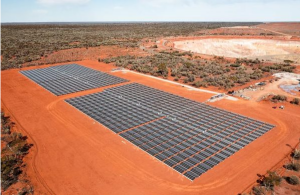Australian solar start-up 5B has launched a new, more powerful version of its pre-assembled and relocatable modular Maverick solar solution as it seeks to accelerate the deployment of solar PV and smooth the way for manufacturing and deployment partners to join its “platform ecosystem”.
5B chief technology officer Simeon Baker-Finch said the new generation Maverick features a higher capacity 48-50 kW DC solar array and “plug-and-play” wiring designed for faster, easier and safer on-site deployment ideally suited for mining, commercial and industrial, and large-scale solar power generation.
“It’s 30% more powerful than the last generation. It’s plug and play pre-wired, easier to manufacture, and safer and faster to deploy,” he said.
“It is compatible with and optimized for the new 540-550 W module class which is fast becoming the preference for our customers in the utility scale solar industry.
“We’re now deploying 5B Mavericks all around the world so we needed to streamline the components, optimize the structure and accept that larger module class.”
Baker-Finch said the new generation Maverick is compatible with all Super League and Tier 1 silicon modules and each array comprises 90 pre-installed modules with preconfigured electricals for rapid connection of return cables to inverter onsite. Each of the nine A-frame beams comprises two rows of five in-portrait modules, connected via a hinge and anchored by a ballast. Each array weighs less than 6000 kilograms and when deployed measures six meters wide and 45 meters long.
 5B chief technical officer Simeon Baker-Finch.Image: 5B
5B chief technical officer Simeon Baker-Finch.Image: 5B
The new Maverick features a new concrete-steel composite beam design which the company said enhances stability in high-wind environments, making it suitable for deployment to sites with 48 m/s wind speed. 5B said the system can be deployed on sites with wind speeds as high as 75 m/s with minor upgrades to configuration.
5B said the increased power capacity of the new Maverick delivers improved shipping density with four arrays able to fit compactly into a standard 40-foot shipping container while the design enables arrays to be positioned more closely onsite, improving land utilization.
Baker-Finch said the design changes would make it easier for manufacturing and deployment partners to become a member of the 5B “platform ecosystem”, helping accelerate the global deployment of solar.
“That is key,” he said. “We don’t need to just get faster in terms of how fast we can deploy a solar array, the reality is that we need to get faster in how quickly we can scale this industry.
“We needed to create a win-win solution where the end customer sees the benefit of the Maverick when it’s deployed on the ground but also that all of our partners, those being the folks that assemble the Mavericks in factories and those that deploy the Maverick on the ground, are able to do so in the most efficient way possible.
“The strategy is to design one and build many. That is what we’re trying to get at with this new generation.
“We have optimized a design that is easier to manufacture so it is much easier to scale up.”
Since the launch of 5B in 2017, the company has completed 52 solar PV projects worldwide totaling more than 32 MWp capacity.

5B’s Maverick arrays have proven popular with remote mining operations. Included in that portfolio is a 12 MW system which it delivered with Enerven for SA Water and a 4.3 MW project it delivered with independent power provider Nomadic Energy Australia for miner Northern Star Resources in Western Australia.
5B’s Maverick system is also the preferred technology for Sun Cable’s massive 17-20 GW solar farm being developed in the Northern Territory with the intent to export solar power to Singapore via a subsea transmission cable.
Baker-Finch said the new generation Maverick would allow the company to “shift the dial so we could get to the next level of volume”.
“We’ve booked more than 100 MW of sales of this new product across four countries (Australia, the United States, Latin America and India) already,” he said.
5B, which has its own manufacturing facility in Sydney, has already teamed with manufacturing partners in Adelaide and Vietnam.
The consortium behind the Sun Cable project is also looking to establish a solar module manufacturing facility in the Northern Territory to feed the $30 billion-plus project. Sun Cable earlier this year lodged a development application for the first phase of a manufacturing and assembly facility to be constructed in Darwin as it continues to progress plans for the world’s biggest solar+storage project.






